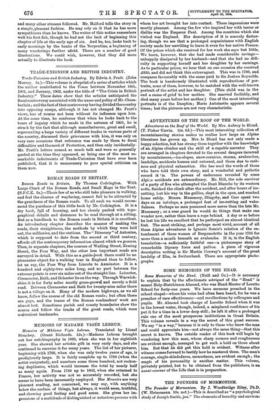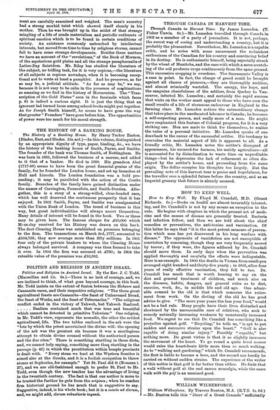meet are carefully examined and weighed. The man's ancestry had
a strong morbid taint which showed itself clearly in his mother. Then he was brought up in the midst of that strange mingling of a life of crude materialism and periodic outbursts of spiritual emotion which is to be found in certain conditions of society. An existence commonly untouched by intellectual interests, but moved from time to time by religious storms, cannot fail to have some strange developments. Besides these matters we have an account of the "revelations," of the Book of Mormon, of the mysterious gold plates and all the strange paraphernalia of Latter-Day Saintdom. Mr. Riley has studied the literature of the subject, no trifling task, for it is very copious,—the literature of all subjects is copious nowadays, when it is becoming excep- tional not to write at least a pamphlet. And he preserves, as far as may be, a judicial attitude. "Az far as may be," we say, because it is not easy to be calm in the presence of combinations so amazing as we find in the history of Mormonism. The " Tran- scription of the Gold Plates" seen in the facsimile which faces p. 81 is indeed a curious sight. It is just the thing that an ignorant lad turned loose among school-books might put together. As for Joseph Smith himself, he seems to have gone the way that greater " Founders" have gone before him. The opportunities of power were too much for his moral strength.
THE HISTORY OF A BANKING HOUSE.
Through Canada in Harvest Time. By James Lumsden. (T. Fisher Unwin. 6s.)—Mr. Lumsden travelled through Canada in 190255 a member of a party of journalists. It is not, perhaps, the surest way of seeing and understanding a country, but it is probably the pleasantest. Nevertheless, Mr. Lumsden is a capable critic, and he notes with some amusement the redundant enthusiasm of the emmrlian for his country and convincing belief in its destiny. He is enthusiastio himself, being especially struck by the wheat of Manitoba, and the ease with which a mere scratch- ing of the soil produces crops continuously from the same ground. This successive cropping is overdone. The Sacramento Valley is a case in point. In fact, the charge of greed could be brought against all classes of pioncers,—they are thoroughly reckless, and almost criminally wasteful. The energy, the hope, and the sanguine cheerfulness of the settlers, from Quebec to Van- couver, infected Mr. ',minden ; and certainly the rapid success that waits on the worker must appeal to theme who have seen the small results of a life of strenuous endeavour in Eugland in the farming class. Mr. Lumsden notices the extraordinary change that takes place in the uneducated labourer in Canada; he becomes a self-respecting person, and really more of a man. Ile might have emphasised this feature of Colonial progress, for it is a very striking one. Man are made to think for themselves, to realise the value of a personal initiative. Mr. Lumsden speaks of one drawback to the career of the successful settler. His tendency to overvalue the material aspect of life is apparent to all. As a friendly critic, Mr. Lumsden notes the settler's cliaregard of appearances, his uncared-for harness, his untidy agriculture—all is accounted for by disinclination to waste time on unprofitable things—but he deprecates the lack of refinement so often dis- played by the settler's house, and proceeding from the same origin. The dollar occupies his thoughts too largely. But the prevailing note of this harvest tour is praise and hopefulness, for the traveller sees a splendid future before the country, and as an Imperial granary that future is already assured.























































 Previous page
Previous page